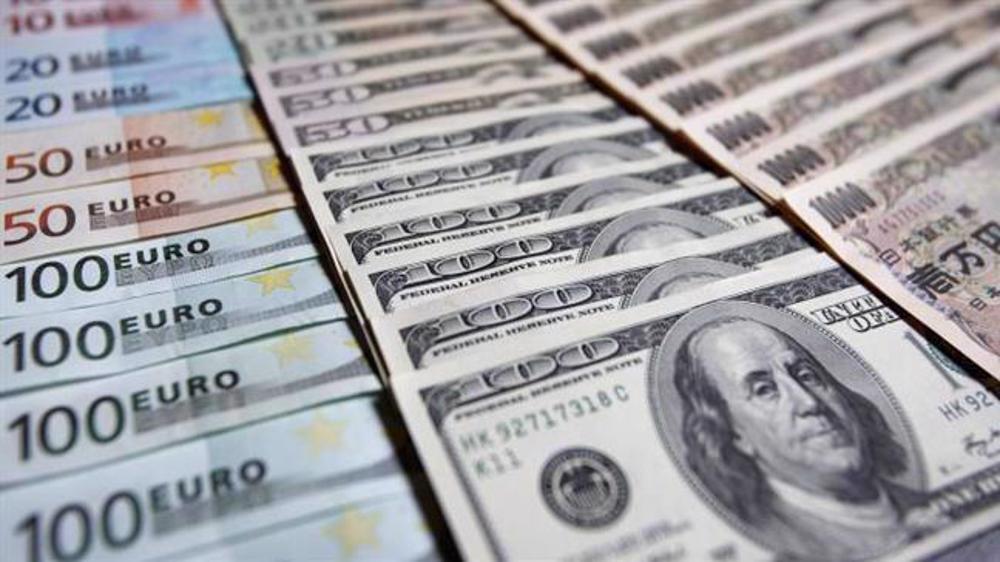ASEAN finance ministers consider ditching US dollar, euro for financial transactions
Finance ministers and central bank governors from the Association of Southeast Asian Nations (ASEAN) have met and discussed ways to ditch the dollar and euro in their financial transactions and move to settlements in local currencies.
The meeting took place in Indonesia and revolved around finding ways to reduce dependence on western currencies, such as the US Dollar, Euro, Yen and British Pound through the Local Currency Transaction (LCT) system, an extension of a previous settlement system that has started to be implemented among ASEAN member states and allows local currencies for trade.
An agreement on a similar system was reached between Indonesia, Malaysia, Singapore, the Philippines, and Thailand last November.
Calling on regional administrations to start using credit cards issued by local banks and gradually stop using foreign payment systems, Indonesian President Joko Widodo said his country needed to shield itself from geopolitical disruptions, citing the sanctions targeting Russia’s financial sector over the conflict in Ukraine.
Moving away from Western payment systems is necessary to protect transactions from “possible geopolitical repercussions,” Widodo said, adding, “Be very careful. We must remember the sanctions imposed by the US on Russia. Visa and Mastercard could be a problem.”
ASEAN includes Brunei, Cambodia, Indonesia, Laos, Malaysia, Myanmar, the Philippines, Singapore, Thailand, and Vietnam, with the International Monetary Fund (IMF)’s figures indicating that the combined nominal GDP of the bloc in 2023 amounts to approximately $3.9 trillion.
Out of the 10 ASEAN member states, only Singapore has enforced Western sanctions on Russia.
Over the past year, a growing number of countries across the world have moved away from conducting trade in US dollars as a result of Washington’s policy of economic warfare.
Brazil, the largest economy in Latin America, reached an agreement with China earlier this week to enable import and export transactions between the two sides to take place without using the US dollar.
Several countries in West Asia and North Africa have also started to move away from the greenback hegemony in recent months, like Iraq, the UAE, Egypt, and Saudi Arabia.
BRICS working on ‘fundamentally new currency’
Meanwhile, Deputy Chairman of Russia’s State Duma, Alexander Babakov, said on Thursday that the BRICS bloc of emerging economies – Brazil, Russia, India, China, and South Africa – was working on developing a “new currency” that would be presented at the organization’s upcoming summit in Durban.
“The transition to settlements in national currencies is the first step. The next one is to provide the circulation of digital or any other form of a fundamentally new currency in the nearest future. I think that at the BRICS [leaders’ summit], the readiness to realize this project will be announced, such works are underway,” Babakov said on the sidelines of the Russian-Indian Strategic Partnership for Development and Growth Business Forum.
Babakov said a single currency could likely emerge within BRICS and would be pegged not just to the value of gold but also to “other groups of products, rare-earth elements, or soil.”
BRICS member states account for more than 40 percent of the global population and around a quarter of the global GDP. In recent months, the group has been positioning itself as the Global South’s alternative to the G7 group of nations.

Indian parliament passes bill seen as step to seizure of mosques

Eid al-Fitr celebrated in Iran, other countries as holy month of Ramadan comes to a close

Iran FM calls for more unity, empathy among Muslims in Eid message
Iran-US talks: Trump, sanctions and the mirage of a durable nuclear deal
US universities defy Trump deportations of foreign students
WFP: Food stocks depleted in Gaza due to all-out Israeli blockade
Yemenis hold nationwide rallies to condemn US aggression, support Palestine
VIDEO | Press TV's news headlines
VIDEO | Gaza’s top surgeon killed under torture in Israeli jails
VIDEO | Araghchi arrives in Oman for US talks; termination of inhumane sanctions ‘priority’
VIDEO | Iran transforms Qeshm Island into Persian Gulf bunkering hub








 This makes it easy to access the Press TV website
This makes it easy to access the Press TV website